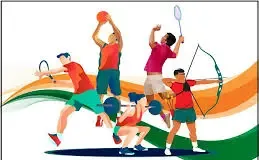Sports represent much more than just recreation. They are a unifying force, a way to build character, and a medium for promoting physical well-being and social harmony. In Jammu and Kashmir, sports carry an even deeper significance as they provide a positive avenue for youth, strengthening tourism and bringing communities closer together. Over the last few years, the Union Territory has witnessed a renewed focus on developing modern facilities and nurturing talent from the earliest stages to the highest levels. From stadiums and indoor complexes to adventure sports hubs, the region has steadily transformed into a promising sports destination where enthusiasm meets opportunity.
The infrastructure landscape of Jammu and Kashmir today reflects both vision and inclusivity. The Sher-e-Kashmir Stadium in Srinagar stands as the valley’s primary cricket venue with potential to host major international matches, while Bakshi Stadium, renovated at a cost of more than fifty crores, has been upgraded to International Federation of Association Football standards to host international football games. Maulana Azad Stadium in Jammu has been modernized to meet International Cricket Council norms and supports both cricket and multi-sport events, whereas the Tourism Reception Centre Synthetic Turf Ground in Srinagar has become home to Real Kashmir football club and national football fixtures. Alongside these, indoor complexes across Srinagar, Jammu and district headquarters now allow year-round games like badminton, volleyball, basketball and gymnastics. With its natural geography, Jammu and Kashmir has also emerged as a global hub for winter sports, with Gulmarg, Pahalgam and Sonamarg drawing visitors for skiing, snowboarding, trekking and ice hockey. The Jawahar Institute of Mountaineering and Winter Sports adds immense value by providing structured training. At the same time, hundreds of mini-stadiums and upgraded playfields at the panchayat level are ensuring that access to sports is not limited to urban areas but reaches even the remotest corners.
These developments have been driven by strong policy support and targeted programs. Under the Khelo India scheme, Centres of Excellence, playfield upgrades and talent hunts have encouraged large-scale participation. In a major boost to aquatic sports, the Khelo India Water Sports Fest 2025 was successfully held in Srinagar, showcasing the region’s potential in kayaking, canoeing and rowing on a national stage. The Jammu and Kashmir Sports Policy 2022 adopts a “Scout, Engage, Facilitate, Recognize” framework that aims to nurture talent with inclusivity, including para-sports. Additionally, projects worth more than four hundred crores funded by Jammu and Kashmir Infrastructure Development Finance Corporation have been sanctioned for swimming pools, synthetic turf fields and athletic tracks. This has created new opportunities in sports such as football, cricket and winter games, while also opening career avenues in coaching, refereeing, physiotherapy and management. Real Kashmir Football Club has already placed the valley on the football map of the country, while Ranji Trophy matches and state-level cricket leagues provide platforms for emerging players. Gulmarg continues to attract global tourists with its adventure sports, linking athletic growth with the tourism economy.
Regular grassroots competitions in schools and villages can help identify raw talent, while public-private partnerships can share the responsibility of maintaining facilities and sponsoring events. Expanding coaching programs to certify and empower local trainers will reduce dependence on external experts and introducing dome stadiums, synthetic surfaces and heated halls will allow uninterrupted play across seasons. Integrating tourism with sports events through combined packages can further enhance both sectors while fostering community engagement.
National Sports Day, celebrated every year on August 29 in honor of Major Dhyan Chand, holds symbolic importance for Jammu and Kashmir as it reflects the spirit of discipline, teamwork and resilience. Across the Union Territory, schools, colleges and stadiums host competitions in football, hockey, volleyball and athletics, along with yoga sessions, martial arts and fitness drives. Special events at Bakshi Stadium in Srinagar and Maulana Azad Stadium in Jammu highlight the achievements of local athletes and inspire the younger generation. By linking such celebrations with ongoing infrastructure development, Jammu and Kashmir sends a strong message that sports are not an extracurricular pastime but a vital part of community growth and youth empowerment. With upgraded grounds, synthetic turfs, world-class winter sports venues and supportive government policies, the region stands at the cusp of becoming a recognized sports hub. However, consistency in maintenance, equitable distribution of resources and investment in human expertise remain essential to sustain this momentum. Sports in Jammu and Kashmir today represent much more than games; they embody unity, opportunity and a promise of recognition at both national and international stages. With continued commitment, the region has the potential to produce champions, host global events and inspire generations to see a future in sports.


